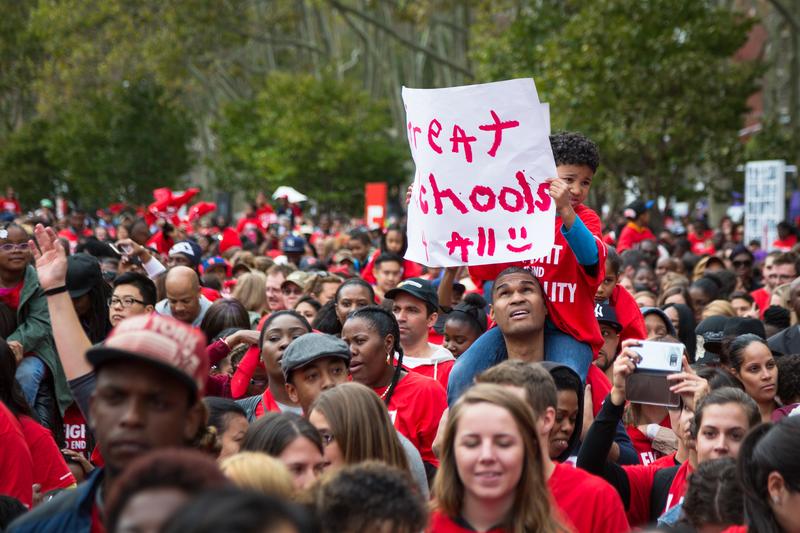 SchoolBook
SchoolBook
Pro-Charter Think Tank Downgrades City's Rating, Citing 'de Blasio' Effect

A think tank that’s strongly supportive of charter schools argued in a study released Wednesday that New York City was no longer the hub for school choice that it was under former Mayor Michael Bloomberg.
Instead, the Thomas B. Fordham Institute declared New Orleans and Washington, D.C. led the pack in promoting choices while New York has fallen into the "mediocre middle," a demotion it blamed on the "de Blasio effect."
The report singled out battles between "charter bête noire Mayor Bill de Blasio” and one charter leader, Success Academy Charter network founder Eva Moskowitz, over whether charters should have free access to public space.
Overall, the study found a dramatic uptick in choices based on its survey of 30 big cities.
"School choice" was defined broadly to include charter and magnet schools, plus financial incentives, such as vouchers and tax credit scholarships for students to attend private schools. Approximately 2.7 million children attended more than 6,400 charter schools across the country during the 2013-14 school year, and all but eight states allow the privately managed but publicly funded schools.
Nonetheless, Priscilla Wohlstetter of Teachers College, who co-authored the report with Dara Zeehandelaar of the Fordham Institute, said there's still “more fragmentation than unification” between the choice sector and traditional public schools. For example, only six cities had a common application process, and many did not provide publicly funded transportation for students to attend non-traditional schools.
The Fordham Institute released a similar study five years ago in which New York came in third in the nation for school choice, after New Orleans and Washington, D.C. Today, those cities earned an A minus and a B-plus, respectively, coming in at first and second place, while New York came in at 12th place with a C grade.
Newark, New Jersey, which also earned a C, scored a little higher, ranking seventh. Although Newark received $100 million from Facebook founder Mark Zuckerberg for school improvement in 2010, the report's authors said school improvements weren't yet apparent. They also noted that the charter-friendly superintendent, Cami Anderson, departed and that Newark's current mayor, Ras Baraka, opposed many of her policies.
The study’s researchers looked at three main categories of choice friendliness: political support, policies that encourage financing for charters and private schools, and the creation of both quantity and quality in school choices.
Michael Petrilli, president of the Fordham Institute, said New York City's low rating was largely based on this third area, which counted for 50 percent of the total score. The city had more than 200 charters, but they enroll less than 10 percent of the city's 1.1 million students. In New Orleans, which came in first, 90 percent of public school students attended charters.
However, Petrilli acknowledged political climate - which accounted for 15 percent of the city's rating - did matter a lot for New York, because de Blasio is not as much of a charter booster as Bloomberg.
“We think that matters,” he said. “That’s not all that matters, there’s still a lot of good infrastructure there in place. But we do think that that makes New York a less hospitable place for school choice than it was previously.”
New York City's Department of Education spokesman Harry Hartfield gave a muted response to the report.
"All families should have access to a wealth of great school options, and we are investing in all our public schools to ensure that parents have choices they need to meet the unique needs of their child," he said. "It doesn't matter whether a student attends a traditional public school or a charter public school - we want every child to get the education they need to succeed.”
The study gave high marks to third place Denver. It also noted that Atlanta had become a model for creating new charters while providing strong oversight. But it said the south has struggled overall, largely because of long-standing concerns over its history of segregation.
The study was funded by the Walton Family Foundation, the Laura and John Arnold Foundation and the Thomas B. Fordham foundation.